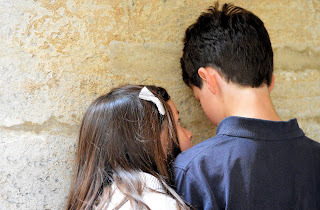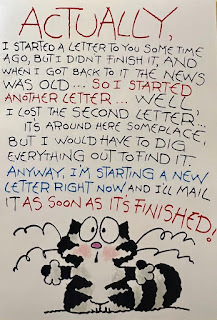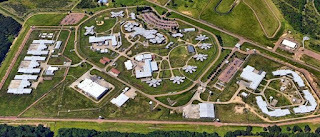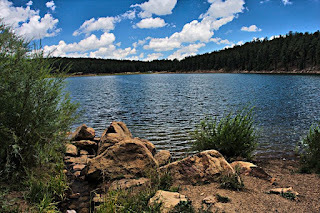Voices Of Our Family
 “Well, what did you think? Don’t you realize that everybody has secret secrets? A hidden life. You have. I have. Didn’t you ever wonder?” --James Lord, MY QUEER WAR
“Well, what did you think? Don’t you realize that everybody has secret secrets? A hidden life. You have. I have. Didn’t you ever wonder?” --James Lord, MY QUEER WAR What a lovely week. I received letters from my first cousin, Mona Armijo, my cousin Rita Sandra Cordova-Donald (who is in a prison cell), and my second cousin, Mary Ann Montoya-Gehling.
From Mona, dated August 29, 1997, Mona’s dad and my dad were brothers:
Well Michael,
The front of this card was so true. I know you’ve written to me many times, but I just couldn’t pass up the front of this card. My gosh, it’s always so good to hear from you.

I am so glad you’re doing so well. You always sound like you’re enjoying life.
My family keeps me very busy and very happy, also. They’ve grown up so much. It’s really fun. I enjoy them so much. I miss ALL my family but the people here in Washington are so easy going and friendly that it’s much nicer to reais the kids here.
Well, I’m going to end here. Tell your mom and brothers I said “HI”, send my love. Come visit us sometime even if it's just for a day or so. I’d love to see you. You’re the only one on my Daddy’s side we hear from, so keep in touch.
Love,
Mona Lisa
From Sandra Donald, dated August 28, 1997, Sandra’s mother and my dad were half-siblings (same mother, different fathers):
Pearl, Mississippi, Thursday Night, Aug. 28, 1997
Dear Cousin, Michael Joe Armijo,
Nice to meet you! I received your sweet thoughtful card a few days ago with much surprise and I must confess: much puzzlement.
Time...please don’t use that word. Time is all I do have. Time in a confined institution, unfortunately.
How was your vacation in New York? Who were you visiting? Were you by yourself? How long did you stay? Did you enjoy yourself?
You must let me know about the Garcia family reunion.
I’m confused when you say you are still waiting...
Please send me your telephone number if you don’t mind me calling you collect. If you do mind, don’t send it because that is the ONLY way I am allowed to talk on the telephone.
I am blessed with a son who will be 31 years old on August 30th. He is a wonderful and “spoiled” person. He is married and has two boys (Blake and Myles). Oh, his name is Harmon Odell Donald III. His phone number is 601-632-1245. He works offshore, so it may be hard to reach him. His wife’s name is Lori, and she stays at her mother’s house a lot when he is not home.
I can’t wait to hear everything about you and your life. Please send me some pictures.
Have you heard from Cousin Cecelia, Uncle Ruebel's daughter?
Photo: Pearl, MS Women's Prison

Well, cousin, I’ll be anxiously awaiting your letter and photos.
All My Love,
God’s Blessings,
Sandy Donald, DOB, October 30, 1944
From Cousin Mary Ann Montoya-Gehling, dated September 1, 1997, Colorado Springs:
Michael,
This is the first draft. I’m glad my mom, Eva, looked at it again. There were several mistakes.
I need to nag a minute. We need to get the family reunion newsletter out NOW, Michael. I’ve asked constantly when the newsletter is coming out last month you gave me a deadline. I had it finished and now it’s 6 ½ weeks later. It’s time to print it.
I think it would be a good idea for someone other than yourself to look over the finished copy of the newsletter. I’m volunteering to do it. Please send it to me as soon as possible. I will gov over it and send it back immediately. I’m sorry I’m not there to help you put it together. I know it’s a lot of work, but this first edition will be the hardest and most time-consuming. Please let me know how I can help you.
M.A.
MaryAnn Montoya-Gehling wrote the following attachment that she referred to as ‘the first draft’:
VOICES OF OUR FAMILY
“Heirlooms we don’t have in our family. But stories we’ve got.” --Rose Chernin
Most people have family heirlooms. Something tangible, a quilt their grandmother stitched by hand, a ring world by their mother, the trunk their grandfather brought from the old country. Whatever it is, it’s treasured. But we of the Garcia clan have heirlooms that are priceless: our stories, handed down from one generation to another. Stories of wagons stuck on a lonely mountain road amid a blizzard. Stories of Grandpa Building the two-room adobe house by hand, of Grandma baking tortillas that rose like pita bread, of the children threading apple rings to dry for the winger. The stories are numerous. Every Garcia has his or her own. Each is valued. Each long to be told.
One of Garcia’s with a story to tell is my mother, Eva Tafoya-Montoya, granddaughter of Manuel and Juanita Garcia, daughter of Juan and Jesusita Garcia-Tafoya. Eva was born in 1914, the second child of Juan and Jesusita. She spent a good part of her childhood in the mountains above Mora, New Mexico. Earlier this year my mother, Eva, consented to let me make a tape recording of some of her memories.
Mary Ann Montoya-Gehling
May 27, 1997, Farmington, NM
Eva: “Times were hard when I was growing up. Mother lost more than one child. But the one I remember the most was my younger sister, Clorinda. I don’t know what year she was born but she was a couple years younger than me. She was a little blond girl and one day she got sick and wanted to die.”
MaryAnn: “How old was she, Mom?”
Eva: “Four years old. I don’t know what she died of. One time, Aunt Matilde’s daughter, Esther, came to visit. Dad was going to build an addition to the house at the time, and there was a big pile of rocks he collected for it. She and Clorinda were both four years old then. I was older and we were climbing on those rocks and playing. You know how kids climb on rocks and Esther and Clorinda fell down. I don’t remember that. I just know we were climbing on those rocks. But Esther said that Clorinda had a big bump on her head, and she wondered if that’s what Clorinda died of. Well, I don’t know.”
MaryAnn: “You don’t know after the fall if that’s when Clorinda got sick?”
Eva: “No, I don’t. Esther wondered if that was the cause of her death. I don’t know if she had internal injuries...but they said that she had eaten Savas.”
MaryAnn: “What are Savas?”
Eva: “Sava beans. The Spanish pronounce it “avas” without the first “S”. They used to put the beans up to dry. We were over at Grandma Tafoya’s, and she had some avas drying. I didn’t eat any, but Clorinda did. They weren’t fresh and completely dry either. She got sick to her stomach. I guess she had been sick all night.”
MaryAnn: “She had only been sick for a day before she died?”
 Eva: “I don’t know. That’s what I remember. I was only five or six at the time. We had one bed with three or four mattresses stacked on it. At night my parents would take one or two and lay them on the floor for us kids. Mom and Dad would sleep on the bed. All I remember is that morning when I woke up. I was on the floor in bed and Clorinda was crying. Mother had been up with Clorinda all night and was busy in the kitchen. We didn’t have hot water bottles or anything. They made their own. They took an iron and wrapped it up in a towel. Mother took that and put it on her stomach. But Clorinda didn’t want it. I heard Mother ask,” Does she want to die?” So, I went and asked her, “Do you want to die?” Clorinda answered, “Yes.” And I never saw her again.”
Eva: “I don’t know. That’s what I remember. I was only five or six at the time. We had one bed with three or four mattresses stacked on it. At night my parents would take one or two and lay them on the floor for us kids. Mom and Dad would sleep on the bed. All I remember is that morning when I woke up. I was on the floor in bed and Clorinda was crying. Mother had been up with Clorinda all night and was busy in the kitchen. We didn’t have hot water bottles or anything. They made their own. They took an iron and wrapped it up in a towel. Mother took that and put it on her stomach. But Clorinda didn’t want it. I heard Mother ask,” Does she want to die?” So, I went and asked her, “Do you want to die?” Clorinda answered, “Yes.” And I never saw her again.”
MaryAnn: “Did they have a funeral for her?”
Eva: “I don’t remember anything else. I went to school and afterwards Grandma Garcia talked to me about little angels. She said Clorinda was a little angel. She said the age of reason happened when a child is seven years old. That’s when they made their first holy communion.
Grandma said, “Clorinda was an angel because she died before she was seven.”
After, she told me that I said, “I want to die before I am seven, so I could be an angel.”
MaryAnn: “Did the family talk about her death?”
 Eva: “No. Mother and Dad took it hard when she died but they never said anything about her. Long after Mother died, Dad talked about Clorinda. That was in the 1960s. Tears came to his eyes when he thought of her. That was the only time he mentioned her to me. The last time I was at Morphy Lake in New Mexico, I noticed the rocks Clorinda fell off were still there.”
Eva: “No. Mother and Dad took it hard when she died but they never said anything about her. Long after Mother died, Dad talked about Clorinda. That was in the 1960s. Tears came to his eyes when he thought of her. That was the only time he mentioned her to me. The last time I was at Morphy Lake in New Mexico, I noticed the rocks Clorinda fell off were still there.” “Our word “holiday” comes from “holy day”, for until recently, humankind’s celebrations were of a religious nature.” --PANATI’s Extraordinary Origins of Everyday Things



